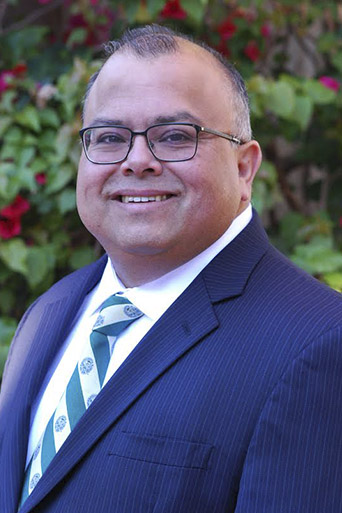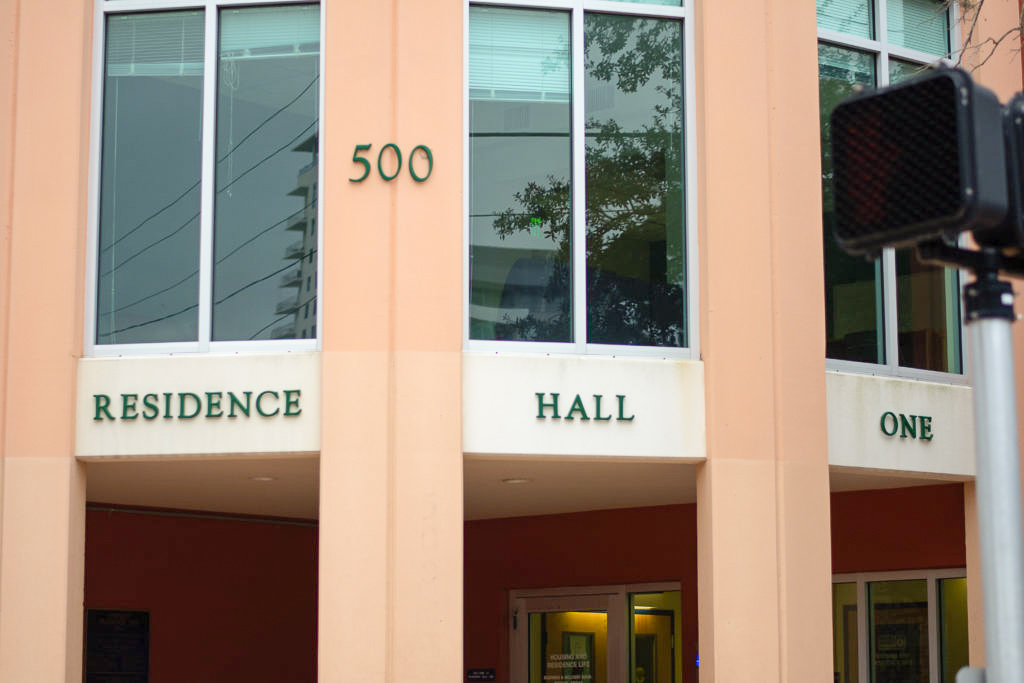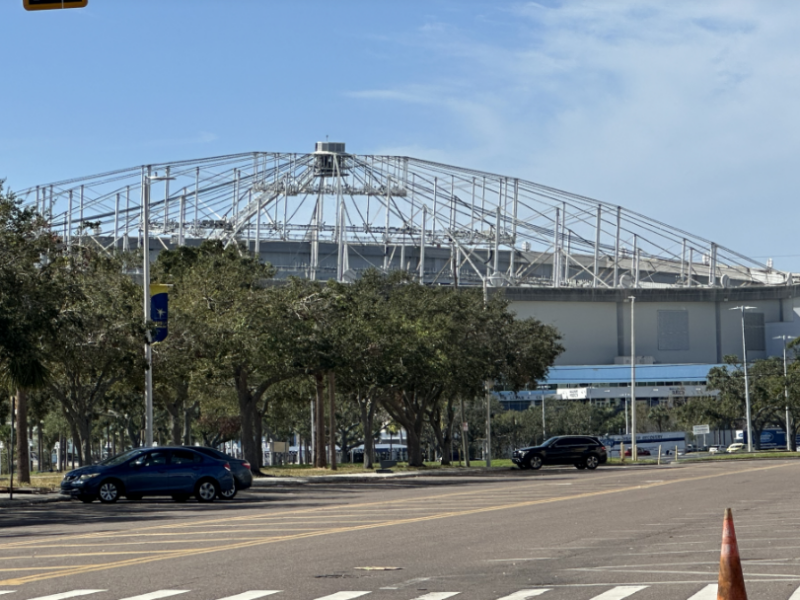
By Amy Diaz and Emily Wunderlich
The man slipped into Residence Hall One by following a resident through the locked entrance.
Once inside, police say, he waited for a female resident he had briefly dated to return to her room.
When she did, he dragged her by the hair to a stairwell, where he battered her. Then he forced her into her car and drove her to a secluded spot near Gandy Beach, where he battered her again.
The assailant, whom campus police identified as a non-student named Anthony Xavier Brown, 19, of Tampa, was arrested shortly after he brought the young woman back to campus seven and a half hours later.
He faces six charges ranging from assault to aggravated stalking and false imprisonment. He is being held in the Pinellas County jail, with bail set at nearly $200,000.
The shaken victim was left with bruises to her throat, left shoulder and right bicep, police say. There was a cut on her left cheek and large tufts of hair missing from her head.
Meanwhile, other students – especially residents of RHO – were left bewildered, angry and full of questions:
How safe is RHO? What can be done to prevent this from happening again? And why did university officials wait six days before Dean of Students Jacob L. Diaz sent an email to students to “make you aware of a situation that occurred in one of our residence halls late last week”?
“How can the dorm entrances get more secure?” asked Annie Schneider, a senior interdisciplinary social science major. “Housing can tell residents all they want to not hold the door for people, but social norms tell these students otherwise and doors get held open all the time.”
Allyson Capati, a sophomore, said in a Facebook comment that the situation is “kind of scary.”
“You don’t really expect to hear this happening when living here,” she said. “But it is very scary to think a student was assaulted horribly here. We can’t really tell who is a student and who is a stranger here.”
Mary Kate Brittain, a sophomore graphic design major, said the situation left her feeling disappointed and unsafe.
“I love St. Pete and consider it my home, but this makes me feel so uneasy and makes my stomach turn for the student who got hurt,” she said. “I understand the suspect was in custody by the time it was resolved, but this happened a week ago. I would have expected an email the next day to be informed and made aware.”
Arielle Zimmerman, a junior graphic design major, had a similar reaction.

“What I find more alarming is the lack of communication between campus security and the student body,” she said. “Considering I live here, I feel that we as students should be the first notified and the first consulted on how to improve campus security … It is appalling how many people were not aware, and found out via local news instead of the place it occurred.”
University officials defended the way they handled the case.
Since Brown was arrested shortly after he brought the victim back to campus, there was “no need for a campus alert,” Diaz said in his email to students.
His comment was reiterated by university spokeswoman Carrie O’Brion, who stressed that the university “really wanted to be respectful of the victim’s privacy.”
As time passed, however, “we did get enough questions from students that we thought it would be appropriate to send out something and just let people know what exactly happened,” O’Brion said.
The victim’s ordeal began at 9:06 p.m. on Feb. 13, police say, when Brown slipped into RHO by following another resident through the locked entrance.
The victim and Brown had dated for two months. When she broke off the relationship, police say, Brown sent her “multiple harassing text messages” over the next week and “made 40-50 calls to the victim’s phone in a 12-hour period.”
When the victim returned to her dorm room, Brown dragged her by her hair to a stairwell, where he battered, punched and strangled her with his bare hands and her jacket.
He then took her car keys and forced her to her car parked outside the dorm, police say. He drove her to a “secluded location near Gandy Beach,” which is a dozen miles from campus, and “continued to batter her.”
When Brown finally returned the victim to RHO about 4:30 a.m. on Feb. 14, she immediately called the police, who arrested Brown nearby minutes later.
University police chief David Hendry praised the victim for doing everything right.

“She did what she could to control the relationship, she reported it to the police, we investigated,” he said. “She’s getting resources to help her now and so we’re appreciative of that.
“Folks should know that those resources are available to help and … violence is just not acceptable.”
Hendry said university police characterized the victim’s injuries as “minor” because of the legal distinction between “battery” and “aggravated battery” in Florida law.
Aggravated battery would mean “much more serious injuries,” such as a fracture or stab wound, Hendry said.
“It did not fall into that category,” Hendry said. “It was dating violence and a battery case, and so they were ‘minor’ injuries.”
Although RHO has a locked entry way, Hendry acknowledged that it’s easy for a non-resident to do what Brown did – wait outside till a resident opens the door using their student ID and then follow him or her inside.
He said university police are working with residential housing staff to find security improvements that meet safety needs as well as the needs of residents and their visitors.
One challenge, Hendry explained, is the timed-entry doors. The Americans with Disabilities Act requires slower-closing doors to ensure all people have enough time to pass through.
While this assists many, it also gives others the opportunity to follow residents in. Hendry said they are “looking for what options are allowable under the law.”
Until new security measures are implemented, Hendry said, RHO residents should not let anybody else follow them through the entrance. As always, he said, students should not walk alone at night, should be alert to their surroundings and should report any suspicious activity to police.
There is also a new safety app USF students can download called “USF Safe.” The app allows students to make emergency calls, report tips to the police and track friends who share their location as they move across campus.
On Feb. 15, the day after Brown’s arrest, university police posted a short crime alert bulletin on their website titled “Physical Assault Incident/Arrest.”
The bulletin reported that “a student in residential housing” had reported an assault and that a former boyfriend, “not affiliated to the university,” had been arrested promptly. It said the student “received minor injuries and has been provided supportive victim resources.”
It did not elaborate, specify the residence hall or describe the assault.
Neither did the longer email that Jacobs sent to all students on Feb. 20, six days later.
Here is the text of Diaz’s email:
Good evening excellent students,
I wanted to make you aware of a situation that occurred in one of our residence halls late last week. Our University Police Department responded to a complaint of a domestic-related physical assault on a student. The suspect, who is not a student, was quickly arrested and transported to the Pinellas County Jail. USFSP also offers support and counseling to any student who is the victim of a crime. Please know that safety and security is the first priority for USFSP. Details of the incident were posted on the UPD’s website (http://www.usfsp.edu/university-police-department/files/2019/02/Crime-Alert-Bulletin-Feb-15-2019.pdf) but there was no need for a community alert because the suspect was already in police custody. UPD officers are constantly looking for new ways to provide a safe campus environment, including the recent introduction of the USF Safe app that allows officers to instantly pinpoint the location of a student who feels threatened. As the UPD posted on its website, violence in any form is not tolerated at USFSP, and we ask all students to report suspicious persons or activities immediately by calling 727-873-4444. If you have questions or concerns, I’m happy to discuss them with you.
Sincerely, Jake



